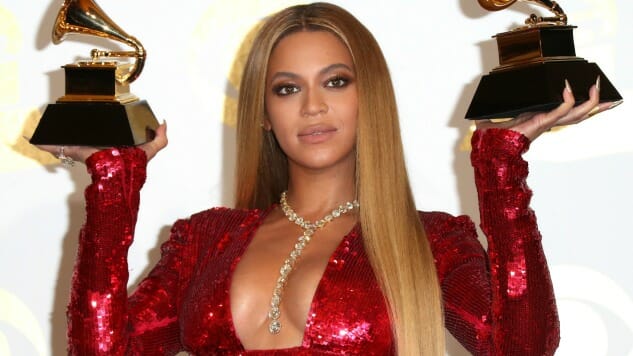Best Thing She Never Had: Beyoncé Was Robbed at the 2017 Grammys
Photo by Frederick M. Brown / Getty Images
Let’s get the obvious out of the way: Beyoncé deserved that Album of the Year Grammy. She deserved it more than Adele (who knew it but accepted her award for 25), she deserved it more than Justin Bieber(?!), she deserved it more than Drake and she deserved it more than Sturgill Simpson (sorry, Sturgill). Even Adele seemed miffed, telling reporters backstage, “I felt like it was her time to win. What the fuck does she have to do to win Album of the Year?”
What, indeed? To date, she’s had three records nominated for the prestigious award, including 2008’s I Am… Sasha Fierce, her 2013 surprise-dropped self-titled and last year’s unmatched Lemonade. And yet she is continuously relegated to dominating more “urban” categories, not including her earlier wins for “Best Pop Vocal Performance” (“Halo,” 2009) and Song of the Year (“Single Ladies (Put a Ring On It),” 2010). To keep her sectioned off is a tremendous mistake. Because if Beyoncé has proven anything over the last two album cycles, it’s that she’s not just a bona fide album artist—she has continuously reworked the very idea of what a long player is.
This was most evident on the groundbreaking “visual album,” Beyoncé, which dropped on iTunes without warning in 2013 and came complete with a music video for each song. Ever since then, “Beyoncé” has shifted from a noun to a verb, with other musicians declaring the release date dead (well, that was just Kanye) and dropping albums with little to no warning (Drake’s 17-song mixtape, If You’re Reading This It’s Too Late, D’Angelo’s Black Messiah, U2’s Songs of Innocence, among others). The record itself was a conceptual thesis statement on the virtues and occasional pitfalls of matrimony (one minute you can be “Drunk in Love,” the next, “Jealous”). Sonically, Beyoncé pushed the boundaries of the slick radio pop for which she’d become best known, loosening her once-controlled delivery to pant “You’re… no… angel… baby” against a wash of synths on “No Angel” and growling with abandon on “Drunk in Love.”
-

-

-

-

-

-

-

-

-

-

-

-

-

-

-

-

-

-

-

-

-

-

-

-

-

-

-

-

-

-

-

-

-

-

-

-

-

-

-

-








































